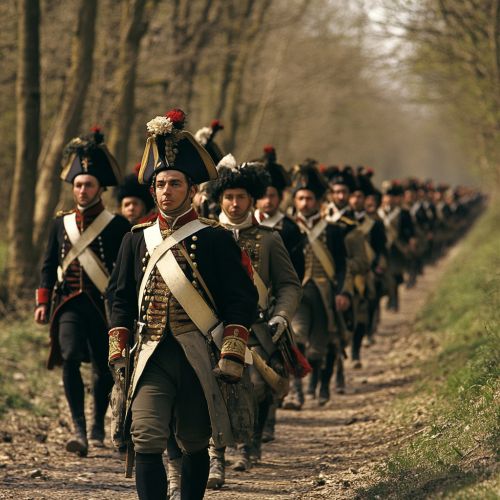French involvement in the American Revolutionary War: Difference between revisions
(Created page with "== Background of French Involvement == The American Revolutionary War (1775-1783) was a pivotal conflict that saw the Thirteen American Colonies break free from British rule. France's involvement in this war was crucial to the eventual success of the American cause. The French government, under King Louis XVI, saw an opportunity to weaken its long-standing rival, Great Britain, by supporting the American colonies. This decision was influenced...") |
No edit summary |
||
| (One intermediate revision by the same user not shown) | |||
| Line 17: | Line 17: | ||
In addition to naval support, France sent thousands of troops to fight alongside American forces. The most famous of these was the [[Expédition Particulière]], led by General [[Jean-Baptiste Donatien de Vimeur, comte de Rochambeau|Rochambeau]]. French troops participated in several important campaigns and battles, including the [[Siege of Yorktown]], which effectively ended the war in favor of the American colonies. | In addition to naval support, France sent thousands of troops to fight alongside American forces. The most famous of these was the [[Expédition Particulière]], led by General [[Jean-Baptiste Donatien de Vimeur, comte de Rochambeau|Rochambeau]]. French troops participated in several important campaigns and battles, including the [[Siege of Yorktown]], which effectively ended the war in favor of the American colonies. | ||
[[Image:Detail-98887.jpg|thumb|center|French soldiers in 18th-century military uniforms marching through a wooded area.|class=only_on_mobile]] | |||
[[Image:Detail-98888.jpg|thumb|center|French soldiers in 18th-century military uniforms marching through a wooded area.|class=only_on_desktop]] | |||
== Economic and Logistical Support == | == Economic and Logistical Support == | ||
Latest revision as of 07:43, 21 October 2024
Background of French Involvement
The American Revolutionary War (1775-1783) was a pivotal conflict that saw the Thirteen American Colonies break free from British rule. France's involvement in this war was crucial to the eventual success of the American cause. The French government, under King Louis XVI, saw an opportunity to weaken its long-standing rival, Great Britain, by supporting the American colonies. This decision was influenced by a variety of factors, including political, economic, and military considerations.
France's interest in the American Revolution was partly motivated by the desire for revenge after its defeat in the Seven Years' War, which had resulted in significant territorial losses. Additionally, the Enlightenment ideals of liberty and democracy resonated with many in France, providing ideological support for the American cause. The French government, however, was initially cautious, fearing the financial burden and the potential for revolutionary ideas to spread to France itself.
Diplomatic Maneuvers and the Treaty of Alliance
The early stages of French involvement were marked by clandestine support. In 1776, the French began secretly supplying the American revolutionaries with arms, ammunition, and other supplies through a fictitious trading company, Roderigue Hortalez and Company. This covert assistance was crucial in sustaining the American war effort during its nascent stages.
The turning point came after the Battle of Saratoga in 1777, a decisive American victory that convinced France of the viability of the American cause. In 1778, France formally entered the war against Britain by signing the Treaty of Alliance with the United States. This treaty was a military pact that promised mutual support in the fight against Britain and marked the beginning of open French military involvement.
Military Contributions
France's military contributions to the American Revolutionary War were substantial and multifaceted. The French provided critical naval support, which was instrumental in countering British naval superiority. The French Navy played a decisive role in several key battles, most notably the Battle of the Chesapeake in 1781, which led to the British surrender at Yorktown.
In addition to naval support, France sent thousands of troops to fight alongside American forces. The most famous of these was the Expédition Particulière, led by General Rochambeau. French troops participated in several important campaigns and battles, including the Siege of Yorktown, which effectively ended the war in favor of the American colonies.


Economic and Logistical Support
Beyond military aid, France provided significant economic and logistical support to the American revolutionaries. This included loans, grants, and the provision of vital supplies such as gunpowder, uniforms, and equipment. The French government also facilitated the acquisition of additional resources through its extensive European networks.
The financial cost of supporting the American Revolution was immense for France, contributing to the country's mounting debt. This economic strain was one of the factors that precipitated the French Revolution in 1789. Despite these costs, French support was indispensable to the American victory, providing the revolutionaries with the means to sustain their fight against the British.
Impact on Franco-British Relations
The American Revolutionary War had a profound impact on Franco-British relations. France's involvement in the war was a strategic move to weaken Britain and restore its own influence on the global stage. The conflict strained British resources and diverted attention from other colonial interests, allowing France to regain some of its lost prestige.
The war also marked a shift in the balance of power in Europe. The Treaty of Paris in 1783, which ended the war, recognized American independence and resulted in territorial gains for France in the Caribbean and Africa. However, the financial burden of the war left France in a precarious economic position, setting the stage for future domestic upheaval.
Legacy and Historical Significance
The legacy of French involvement in the American Revolutionary War is multifaceted. On one hand, it demonstrated the effectiveness of international alliances in achieving military and political objectives. The French-American alliance set a precedent for future diplomatic and military collaborations.
On the other hand, the war highlighted the interconnectedness of global politics and the far-reaching consequences of international conflicts. France's support for the American Revolution had unintended repercussions, contributing to the financial crisis that led to the French Revolution.
The American Revolutionary War also had a lasting impact on French military and political strategy. It underscored the importance of naval power and the need for a strong, adaptable military force. The war also influenced French political thought, reinforcing Enlightenment ideals and inspiring future revolutionary movements.
